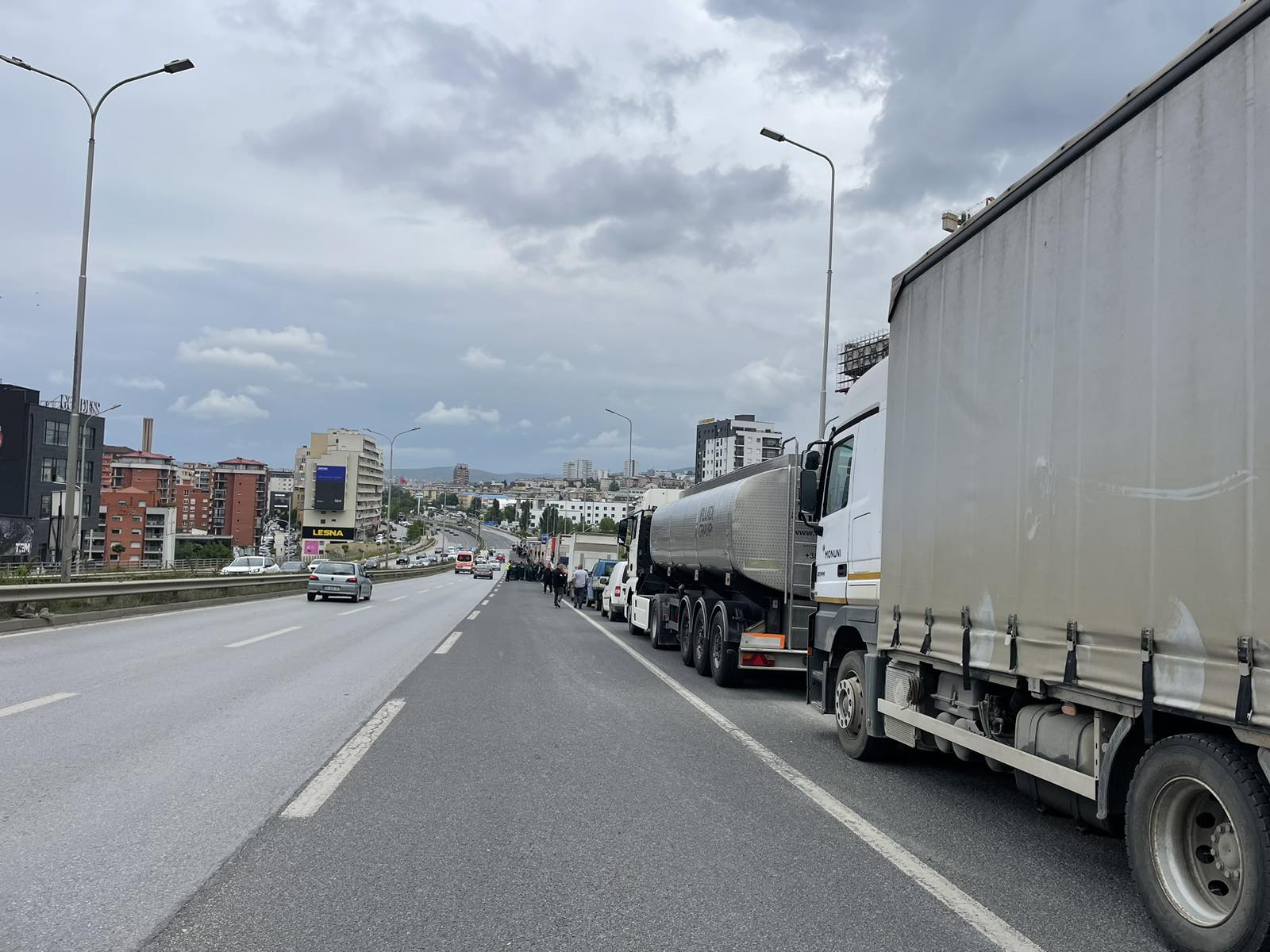

 Truck blockades by businesses halt traffic at Prishtina’s entrances in protest for the delay of energy market liberalisation decision. Photo: Kallxo.com
Truck blockades by businesses halt traffic at Prishtina’s entrances in protest for the delay of energy market liberalisation decision. Photo: Kallxo.com
Several major entry points to Kosovo’s capital, Prishtina, were temporarily blocked on Thursday morning in a protest organised by the Kosovo Chamber of Commerce demanding a delay of the Energy Regulatory Office decision to liberalise the electricity market, a measure set to take effect on June 1.
Major roads leading into Prishtina were temporarily blocked on Thursday as hundreds of businesses gathered to protest the upcoming liberalisation ofKosovo’s electricity market—a reform set by the Energy Regulatory Office, ERO—warning that the decision could lead to higher costs and threaten the survival of many industrial enterprises.
The protest, held from 10:00 a.m. to 12:00 p.m., disrupted traffic at several main entry points into the city. Meanwhile, police units were deployed to manage the protest and traffic.
The ERO April 2025 ruling requires large businesses to leave the regulated electricity tariff system and secure their own suppliers on the open market.
Under the new rules, companies with more than 50 employees or an annual turnover exceeding 10 million euros will no longer receive electricity at regulated prices. If they fail to contract a supplier, they will automatically be transferred to the “Supplier of Last Resort,” currently the Kosovo Energy Corporation, KEK, which offers higher unregulated rates.
The Supplier of Last Resort is designated by ERO through a public tender process and failure to sign a contract with a licensed supplier, it risks businesses being disconnected from the power grid.

The protest drew criticism from Acting Prime Minister Albin Kurti during a government meeting on Thursday. Kurti accused the Kosovo Chamber of Commerce of acting irresponsibly and failing to prepare the businesses for the upcoming market changes.
“The Kosovo Chamber of Commerce, which should be helping businesses navigate this new reality, is instead attempting to block major roads with a single demand: to delay the implementation of market liberalisation,” Kurti said.
“They are justifying this delay by claiming they need one more year to prepare, conveniently ignoring the fact that nothing has been done over the last eight years, during which the process was repeatedly postponed.”
Kurti added that delaying the transition does not solve the underlying problems, but merely shifts the cost of electricity from about 1,200 large businesses onto households and smaller companies.
“They’re trying to protect the 1% of the most powerful enterprises at the expense of the remaining 99% and families across Kosovo,” Kurti added.
“But the era of barricades is over. We’ve removed them wherever they were and have vowed not to allow new ones to be erected,” he emphasized.
Business representatives, on the other hand, described the government’s move as rushed and potentially devastating for the industrial sector.
Nexhat Geci, from the “Vëllezërit Geci” construction material company, warned that the lack of suppliers in the liberalised market could drive many producers out of business.
“We’ve tried all peaceful means to communicate with the responsible institutions, but to no result. That’s why we’ve taken this step,” Geci said. “We’re facing enormous uncertainty, we don’t even know how much electricity prices will increase.”
The businesses argue that the open market lacks sufficient competition and diversity, leading to an effective monopoly that could drastically raise prices. They have called for the decision to be postponed until a well-functioning and diverse supplier market is established.
In a press conference on Thursday, acting Minister of Economy Artane Rizvanolli stated that the liberalisation process is mandated by the Electricity Law, adopted in 2016. She pointed out that Kosovo is the last country in the region to implement this transition.
“These businesses represent less than 1% of all enterprises in Kosovo, yet they are the largest and most powerful, among them are about 300 manufacturers which are also the biggest electricity consumers and, therefore, most affected by liberalisation,” Rizvanolli said.
Currently, 21 electricity suppliers are licensed to operate in Kosovo according to the minister.
Rizvanolli further noted that the Chamber of Commerce has been “discouraging businesses from participating in constructive meetings, instead pushing them to protest.”
In late March 2025, ERO told BIRN that the majority of the consumption is covered by local production, with over 77% by outdated coal power plants, which lack flexibility to adapt to changes in demand, especially during peak times and over 22 per cent by renewable energy sources.
29 May 2025 - 17:35

Kosovo and Ukraine do not have diplomatic relations, nor do they recog...

Albin Kurti secured his third term as Prime Minister, winning the back...

After the December 2025 snap elections, Kosovo is braced to inaugurate...

A decisive win for the ruling Vetëvendosje party in the December 28 e...